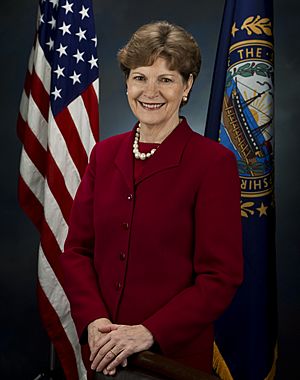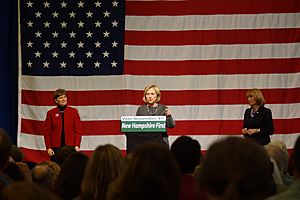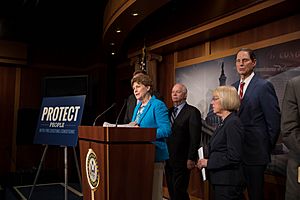Jeanne Shaheen facts for kids
Quick facts for kids
Jeanne Shaheen
|
|||||||||||||||||||||||||||||||
|---|---|---|---|---|---|---|---|---|---|---|---|---|---|---|---|---|---|---|---|---|---|---|---|---|---|---|---|---|---|---|---|
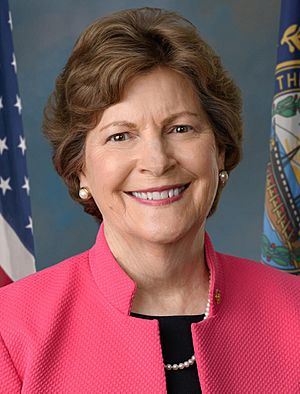
Official portrait, 2021
|
|||||||||||||||||||||||||||||||
| United States Senator from New Hampshire |
|||||||||||||||||||||||||||||||
| Assumed office January 3, 2009 Serving with Maggie Hassan
|
|||||||||||||||||||||||||||||||
| Preceded by | John Sununu | ||||||||||||||||||||||||||||||
|
|||||||||||||||||||||||||||||||
| 78th Governor of New Hampshire | |||||||||||||||||||||||||||||||
| In office January 9, 1997 – January 9, 2003 |
|||||||||||||||||||||||||||||||
| Preceded by | Steve Merrill | ||||||||||||||||||||||||||||||
| Succeeded by | Craig Benson | ||||||||||||||||||||||||||||||
| Member of the New Hampshire Senate from the 21st district |
|||||||||||||||||||||||||||||||
| In office December 5, 1990 – December 4, 1996 |
|||||||||||||||||||||||||||||||
| Preceded by | Franklin Torr | ||||||||||||||||||||||||||||||
| Succeeded by | Katie Wheeler | ||||||||||||||||||||||||||||||
| Personal details | |||||||||||||||||||||||||||||||
| Born |
Cynthia Jeanne Bowers
January 28, 1947 St. Charles, Missouri, U.S. |
||||||||||||||||||||||||||||||
| Political party | Democratic | ||||||||||||||||||||||||||||||
| Spouse |
William Shaheen
(m. 1972) |
||||||||||||||||||||||||||||||
| Children | 3 | ||||||||||||||||||||||||||||||
| Education | Shippensburg University (BA) University of Mississippi (MSS) |
||||||||||||||||||||||||||||||
| Signature | |||||||||||||||||||||||||||||||
| Website | |||||||||||||||||||||||||||||||
Cynthia Jeanne Shaheen (born January 28, 1947) is an American politician. She has been a U.S. Senator for New Hampshire since 2009. She is a member of the Democratic Party. Before becoming a senator, she was the 78th governor of New Hampshire from 1997 to 2003.
Jeanne Shaheen made history as the first woman to be elected as both a governor and a U.S. senator. She was also the first woman elected governor of New Hampshire. She announced on March 12, 2025, that she would not run for reelection in 2026. Since 2023, she has been the oldest female U.S. senator.
Early Life and Education
Jeanne Shaheen was born Cynthia Jeanne Bowers in St. Charles, Missouri. Her parents were Belle Ernestine (Stillings) and Ivan E. Bowers.
She finished high school in Selinsgrove, Pennsylvania. She earned a bachelor's degree in English from Shippensburg University of Pennsylvania. Later, she received a master's degree in political science from the University of Mississippi. She taught high school in Mississippi before moving to New Hampshire in 1973. There, she also worked as a teacher.
Personal Life
Jeanne Shaheen is married to Bill Shaheen. He is an attorney and a judge. They have three children. They used to own a store in New Hampshire that sold used jewelry.
Early Political Career
Jeanne Shaheen is a Democrat. She worked on several political campaigns. This included Jimmy Carter's presidential campaign in 1976. She also managed Gary Hart's New Hampshire campaign in 1984.
In 1990, she ran for office herself. She was elected to the state Senate for the 21st district. She served there for six years. In 1996, she was elected governor of New Hampshire. She was reelected in 1998 and 2000.
In April 2005, Shaheen became the director of Harvard's Institute of Politics. She took over from former U.S. Representative Dan Glickman.
Governor of New Hampshire
Jeanne Shaheen decided to run for governor when Republican Governor Steve Merrill retired. Her opponent in 1996 was Ovide M. Lamontagne. He was the chairman of the State Board of Education at the time. Shaheen presented herself as a moderate politician.
She focused on how schools were funded. She also promised to expand kindergarten programs. She won the election against Lamontagne. Shaheen became the first woman to be elected governor of New Hampshire. (However, Vesta M. Roy was acting governor for a short time in 1982-1983).
In 1998, she was reelected by a large margin. In both 1996 and 1998, Shaheen promised not to raise new taxes. After a court decision about school funding, her team created a plan. This plan would have increased school spending and set a statewide property tax.
When she ran for a third term in 2000, Shaheen did not renew her no-new-taxes promise. She was the first New Hampshire governor in 38 years to win without making that promise. Shaheen wanted to solve the school funding problem with legalized video gambling at racetracks. However, the state legislature rejected this idea many times.
In 2001, Shaheen tried to put in place a 2.5% sales tax. New Hampshire had never had a sales tax before. The state legislature rejected her idea. She also suggested increasing the state's cigarette tax and a 4.5% tax on capital gains.
Presidential Politics
Supporting Presidential Candidates
During the 2000 Democratic presidential primary in New Hampshire, Shaheen supported Al Gore. Her husband managed Gore's campaign in New Hampshire. They were very important in helping Gore win a close victory in the New Hampshire primary.
Gore considered Shaheen as a possible vice presidential nominee. Shaheen said she was not interested in the job. After teaching at Harvard University, Shaheen became the national chairperson for John Kerry's 2004 presidential campaign in September 2003.
U.S. Senate

Senate Elections
2002 Election
After serving three terms as governor, Shaheen decided not to run for a fourth term. Instead, she ran for the U.S. Senate in 2002. She lost to Republican John E. Sununu. Shaheen later said her loss was partly due to discussions about her work as governor.
2008 Election
In 2007, polls showed Shaheen could beat Sununu in the 2008 Senate race. On September 14, 2007, Shaheen announced she would run. She officially started her campaign the next day. Shaheen defeated Sununu in the election.
2014 Election
Shaheen ran for reelection in 2014. She faced former Massachusetts Senator Scott Brown. In March 2014, Brown announced he was thinking about running against Shaheen.
Shaheen won reelection with 51% of the vote. She became only the second Democrat in New Hampshire's history to win two terms in the Senate.
2020 Election
Shaheen was reelected in 2020. She won with 57% of the vote against Republican Bryant “Corky” Messner. She is the first New Hampshire Democrat to be elected to three full terms in the Senate.
Time in the Senate

Jeanne Shaheen was sworn into the United States Senate on January 3, 2009. As a senator, she has sponsored many bills. Five of these bills have become law.
On January 6, 2021, Shaheen was part of the process to confirm the 2020 election results. Protesters attacked the U.S. Capitol that day. Shaheen tweeted that she and her staff were safe. She said they would not be stopped from doing their duty. The day after the attack, Shaheen said that the former president was "unfit for office." She supported removing him from office.
In 2024, Shaheen was named among the top 10 most bipartisan senators. This means she often works with members of both major political parties.
Committee Roles

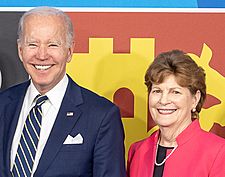
As a U.S. Senator, Jeanne Shaheen serves on several important committees:
- Committee on Appropriations (This committee decides how the government spends money.)
- Subcommittee on Commerce, Justice, Science, and Related Agencies (Chair)
- Subcommittee on Defense
- Subcommittee on Energy and Water Development
- Subcommittee on Homeland Security
- Subcommittee on Labor, Health and Human Services, Education, and Related Agencies
- Subcommittee on the Department of State, Foreign Operations, and Related Programs
- Committee on Armed Services (This committee deals with military matters.)
- Committee on Foreign Relations (This committee handles relationships with other countries.)
- Committee on Small Business (chair) (This committee helps small businesses.)
- Select Committee on Ethics (This committee looks into ethical issues for senators.)
- Commission on Security and Cooperation in Europe
Caucus Memberships
Shaheen is also part of several groups of senators who work on specific issues:
- Afterschool Caucuses
- Senate Taiwan Caucus
- Senate National Guard Caucus (co-chair)
- Rare Disease Caucus
Political Views
Healthcare
In 2009, Shaheen worked with Senator Susan Collins. They introduced a bill to improve care for hospital patients after they are discharged. This helps reduce how often patients need to go back to the hospital. The bill passed in 2010. Experts believed it would save money and improve healthcare.
In December 2009, Shaheen voted for the Patient Protection and Affordable Care Act (often called Obamacare). In August 2019, Shaheen and 18 other senators asked for information from the government. They wanted to understand how a lawsuit against the Affordable Care Act might affect states and people.
In October 2019, Shaheen and 26 other senators asked for a bill to pass that would fund community health centers. They warned that if funding stopped, many centers would close. This would affect healthcare for millions of Americans.
Fiscal Policy
On October 11, 2011, Shaheen voted for a bill that included $446 billion for infrastructure and schools. It also provided money for state and local governments. The bill would have been paid for by a tax on high incomes. However, the bill did not pass.
Shaheen also supported restoring funding for a federal prison in Berlin, New Hampshire. This was done through a special spending request in a large bill.
Gun Policy
Shaheen supports making it illegal for people on the terrorist watchlist to buy guns. She voted for a bill to expand background checks for gun purchases. She also voted to ban magazines that hold more than 10 bullets. In 2016, she joined other senators in a protest to push for new gun laws. She said that "moments of sympathy are not enough" and that common-sense gun laws are needed.
Energy
After the BP oil spill in 2010, Shaheen suggested getting rid of the agency that regulates offshore drilling. She believed a new agency was needed because reforms had not been enough. Shaheen also proposed giving a special commission the power to demand information for its investigation. She said this was important to prevent future disasters.
In April 2014, Shaheen introduced a bill to improve efficient energy use. In March 2019, she supported a bill to make certain chemicals (PFAS) hazardous substances. This would allow cleanup funds to be used and require polluters to pay for cleanup. Shaheen was against the Nord Stream 2 pipeline. This pipeline was planned to deliver natural gas from Russia to Germany.
Iraq War
In 2002, Shaheen supported the 2003 invasion of Iraq. She also supported removing Saddam Hussein from power. She said she came to this view after meeting with a former national security advisor. At the time, this issue was not a major part of her election campaign.
Later, Shaheen questioned how President George W. Bush handled the situation in Iraq. In a 2004 interview, she said that Bush had "misled us into war in Iraq." She stated that the war had not made the U.S. safer. She also said that claims about weapons of mass destruction and links to terrorists were not true.
War in Afghanistan
Shaheen was against the withdrawal of U.S. troops from Afghanistan in 2021. This withdrawal happened under President Joe Biden.
LGBT Rights
Shaheen first opposed same-sex marriage when she was governor of New Hampshire. However, in 2009, she began to support marriage for same-sex couples. She also supported a law called the Respect for Marriage Act. She voted to end the "Don't Ask, Don't Tell" policy. This policy had prevented openly gay people from serving in the military. She also supports government recognition of same-sex spouses of military and other government workers.
Minimum Wage
On March 5, 2021, Shaheen voted against an amendment to raise the minimum wage to $15 per hour. This amendment was part of the American Rescue Plan Act of 2021.
Immigration
In 2025, Shaheen was one of 12 Democratic senators who voted for the Laken Riley Act. All Republican senators also voted for this act.
Electoral History
Governor elections in New Hampshire: Results 1996–2000
| Year | Democratic | Votes | Pct | Republican | Votes | Pct | 3rd Party | Party | Votes | Pct | 3rd Party | Party | Votes | Pct | |||||
|---|---|---|---|---|---|---|---|---|---|---|---|---|---|---|---|---|---|---|---|
| 1996 | Jeanne Shaheen | 284,175 | 57% | Ovide Lamontagne | 196,321 | 40% | Fred Bramante | Independent Reform | 10,316 | 2% | Robert Kingsbury | Libertarian | 5,974 | 1% | |||||
| 1998 | Jeanne Shaheen (inc.) | 210,769 | 66% | Jay Lucas | 98,473 | 31% | Ken Blevens | Libertarian | 8,655 | 3% | Write-ins | Write-ins | 503 | <1% | |||||
| 2000 | Jeanne Shaheen (inc.) | 275,038 | 49% | Gordon Humphrey | 246,952 | 44% | Mary Brown | Independent | 35,904 | 6% | John Babiarz | Libertarian | 6,446 | 1% |
| Year | Democratic | Votes | Pct | Republican | Votes | Pct | 3rd Party | Party | Votes | Pct | 3rd Party | Party | Votes | Pct | |||||
|---|---|---|---|---|---|---|---|---|---|---|---|---|---|---|---|---|---|---|---|
| 2002 | Jeanne Shaheen | 207,478 | 46% | John E. Sununu | 227,229 | 51% | Ken Blevens | Libertarian | 9,835 | 2% | Bob Smith | Write-in | 2,396 | 1% | * | ||||
| 2008 | Jeanne Shaheen | 358,947 | 52% | John E. Sununu (inc.) | 314,412 | 45% | Ken Blevens | Libertarian | 21,381 | 3% | |||||||||
| 2014 | Jeanne Shaheen (inc.) | 251,184 | 51% | Scott Brown | 235,347 | 48% | |||||||||||||
| 2020 | Jeanne Shaheen (inc.) | 450,771 | 57% | Corky Messner | 326,229 | 41% | Justin O'Donnell | Libertarian | 18,421 | 2% |
*Write-in and minor candidate notes: In 2002, write-ins received 197 votes. Primaries
| New Hampshire Governor Democratic primary election, 1996 | |||
|---|---|---|---|
| Party | Candidate | Votes | % |
| Democratic | Jeanne Shaheen | 52,238 | 88% |
| Democratic | Lovett | 4,286 | 7% |
| Democratic | Woodworth | 2,609 | 4% |
| New Hampshire Governor Democratic primary election, 2000 | |||
|---|---|---|---|
| Party | Candidate | Votes | % |
| Democratic | Jeanne Shaheen (inc.) | 45,249 | 60% |
| Democratic | Mark Fernald | 28,488 | 38% |
| U.S. Senate Democratic primary election in New Hampshire, 2008 | |||
|---|---|---|---|
| Party | Candidate | Votes | % |
| Democratic | Jeanne Shaheen | 43,968 | 89% |
| Democratic | Raymond Stebbins | 5,281 | 11% |
See also
 In Spanish: Jeanne Shaheen para niños
In Spanish: Jeanne Shaheen para niños
 | Georgia Louise Harris Brown |
 | Julian Abele |
 | Norma Merrick Sklarek |
 | William Sidney Pittman |


